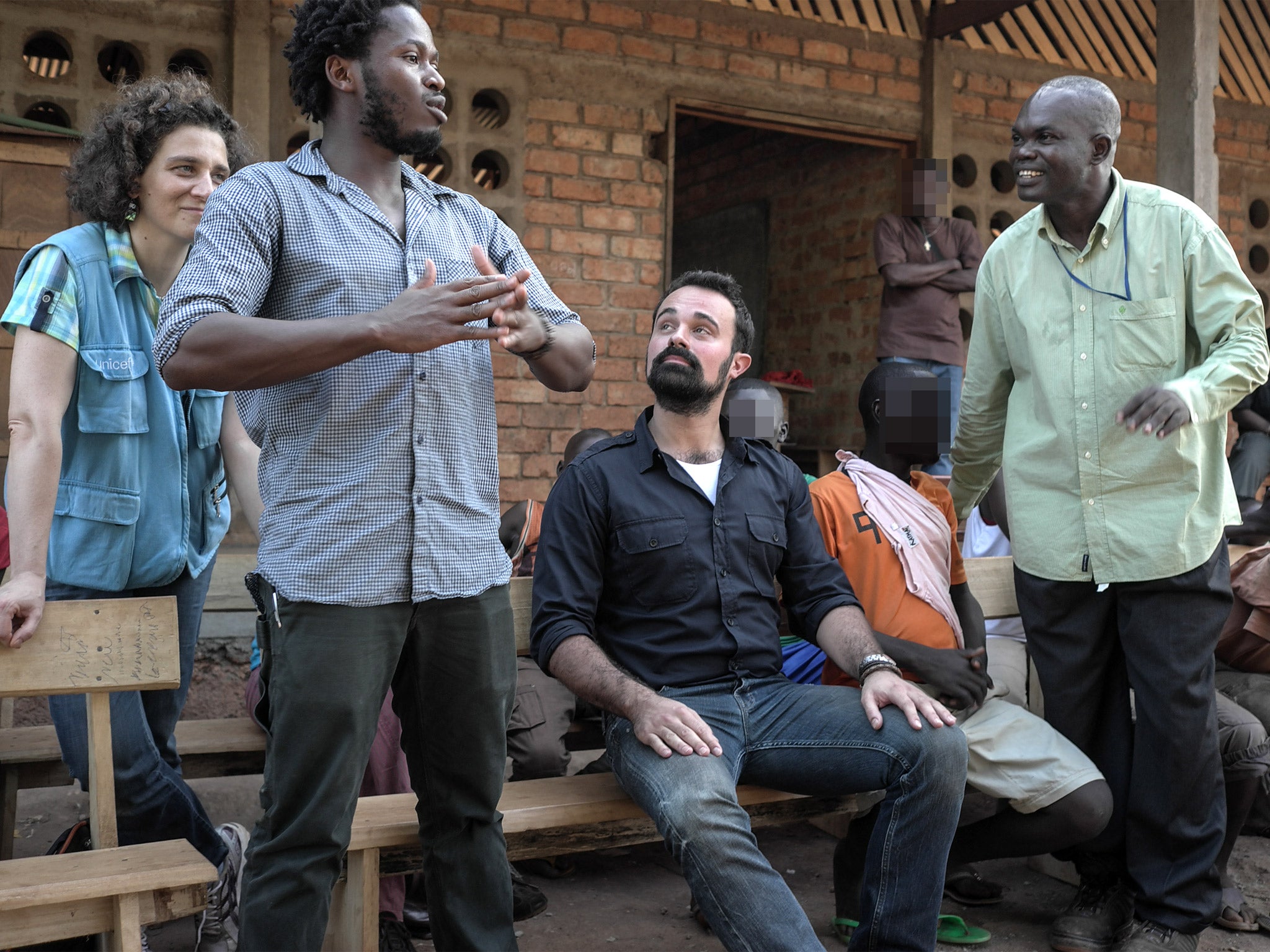Why we need to talk about child soldiers
Chairman of the Independent Evgeny Lebedev meets Ishmael Beah, a former child soldier and now acclaimed author and campaigner


Your support helps us to tell the story
From reproductive rights to climate change to Big Tech, The Independent is on the ground when the story is developing. Whether it's investigating the financials of Elon Musk's pro-Trump PAC or producing our latest documentary, 'The A Word', which shines a light on the American women fighting for reproductive rights, we know how important it is to parse out the facts from the messaging.
At such a critical moment in US history, we need reporters on the ground. Your donation allows us to keep sending journalists to speak to both sides of the story.
The Independent is trusted by Americans across the entire political spectrum. And unlike many other quality news outlets, we choose not to lock Americans out of our reporting and analysis with paywalls. We believe quality journalism should be available to everyone, paid for by those who can afford it.
Your support makes all the difference.
Please donate to our appeal for child soldiers here.
Few people have expressed the agony of child soldiers so movingly as Ishmael Beah. Rescued as a teenager from a life of enforced killing in Sierra Leone, he found a new life in the US, became an acclaimed author, and now campaigns tirelessly for Unicef to help others who, like him, have had their childhoods stolen. Evgeny Lebedev spoke to him during a visit to observe the charity’s work in the Central African Republic
Evgeny Lebedev: It’s very difficult to get your head round what’s going on. With starvation it’s easy to explain and emotionally relate to. This is more difficult to relate to: that there are men with guns who take children prisoner and make them into soldiers or sex slaves and basically steal their childhoods.
Your background is similar to that of the boy we saw rescued yesterday and the others whom the rebels decided at the last minute they would not release. What did you feel in that situation?
Ishmael Beah: Uncertainty. There is uncertainty on both sides. The Unicef staff make the journey to these rebel bases, but they don’t know what the outcome is going to be. The children there don’t know whether they will be leaving that day or not. You don’t know that you are finally, truly, going to be freed until the vehicle starts moving.
As you drive away, and the hours go by on the road, it starts to sink in. But it takes weeks and months to come to terms with the fact that you have been freed.
EL: But you didn’t know anyone was coming for you. It was a complete surprise, right?
IB: I did not. In my case I’d come to the base to get more ammunition before going back into the bush. I wasn’t aware of anything happening. Suddenly I was asked to stand in line, give my age, etc.
But the Unicef people, who expose themselves tremendously by negotiating with armed rebels, are dealing with people who have weapons and don’t keep their word. The releases require a lot of back and forth and forceful but respectful negotiation. These guys are unpredictable; they say one thing, do another.
EL: So how do the children react, as they are being driven away?
IB: When the kids ask where they are going, they can be shown photos and videos. The kids can even send messages to those in the bush and let them know they are fine in the centre.
EL: They were much more upbeat when they got to the centre than I expected. You could see them coming back to themselves. It was joyous during the welcome ceremony, when we played games and danced. I am not easily moved but when the two children arrived who had been released, it was really emotional. They were literally picked up and carried by the others. It was like the restoration of childhood.
And their questions and the things they said were very impressive. I suppose when you go through an experience like that you grow up very quickly. The things very small children said were very grown up, like thinking about the other children still held by the rebel group.
IB: The centre is impressive, and the staff engage and manage the kids well. These kids are coming from tremendous suffering and they know a moment of happiness. So when they have a chance to dance, they will dance. They will do it wholeheartedly. When you’re coming from this experience, when everything is very fragile, this is the joy you see. They will celebrate every moment in case they can’t do tomorrow.
These young people cherish every single moment in life, no matter how small. I would never wish what these children have been through on anybody. But because we’ve been through it we do appreciate certain things. That’s the point of sharing some of these stories, so that people can stop and think. All of us are fortunate, and we can participate in helping others get ahead in life.
When I first started living in the United States, I would get really upset, as I’d go to other kids’ houses and they’d be shouting at their parents and didn’t want to sit at the dinner table with their parents. And it did upset me tremendously, as I’d be thinking: I don’t have any family, I lost all my family in the war.
EL: I love Africa. I travelled with my grandfather – he was a biologist – from the age of 10. I have travelled quite a lot around eastern and southern Africa. But this is my first time in central Africa, and particularly Central African Republic. It’s such a little-known country, and the first place I’ve been to that is so consistently underdeveloped and extremely poor, as well as being dominated in places by big scary men with machine-guns.
But what struck me most forcibly is work done by the heroic women from Unicef we have seen at work, going there day after day, meeting the rebel leaders and bringing some of the children back.
When you read about big organisations like Unicef, they seem almost faceless. But seeing people out in the field being truly heroic … I’m Russian, so I don’t drop these words easily. It was extraordinary to see the work they do to restore the childhood stolen away from these children.
Every human being deserves to have a childhood. So I’m hoping that Independent readers, through our Christmas campaign, our appeal and our auction, will raise as much money as possible for this amazing work.
IB: There is such a need for people to know what’s happening here with people working to remove these children from these fighting groups and give them opportunities.
EL: Is there a particular moment from this trip that you’ll take away with you?
IB: There was a little boy, when we first got back to the transit centre, who stood up and explained about the harsh punishments he’d been through, being tied up and everything.
There was a strength in him that quite moved me. He was basically saying: “It’s good you guys are here, and trying to understand what we’ve been through, but it’s not easy.”
He’s right. It’s not easy. That’s why we need all the help we can get.
Evgeny Lebedev is owner of The Independent and Evening Standard newspapers. Follow him on Twitter @mrevgenylebedev
Money raised by the Independent Christmas Appeal will help fund Unicef’s work with former child soldiers in Central African Republic. For details, visit the campaign homepage
Join our commenting forum
Join thought-provoking conversations, follow other Independent readers and see their replies
Comments